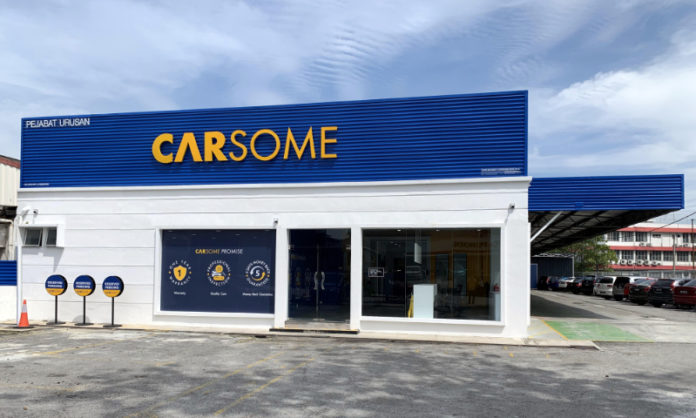COVID-19 has disrupted nearly every business on the planet, including the auto industry. Since the pandemic began in 2020, there have been worldwide factory closures, massive layoffs, declining new car sales, and a chip shortage that is expected to cost $110 billion in revenue.
Used car sales in Malaysia, however, paint a different picture as transactions increased by 20% in 2021. One of the companies leading the charge is Carsome, a Petaling-Jaya-headquartered car e-commerce platform. Carsome, however, is no mere used car platform as it uses data extensively to help guide business decisions. This includes auction and market data, and a machine learning (ML) model for its vehicle pricing optimisation and inventory support system.
Earlier this year, Carsome brought in Piyush Palkar as its Chief Data Officer to spearhead its analytics, data maturity, data engineering and management, as well as its artificial intelligence (AI) innovation efforts. Palkar dedicated much of his career to data and analytics. He was previously Head of Data in Chinese tech conglomerate Tencent and video on-demand service iflix.
We recently got in touch with Palkar to discuss how Carsome leverages the data it gathers, the lessons Palkar learned in using data across various verticals, the future of the auto industry post-COVID, and so much more.
On the data collected over the past six years, could you talk about the different types of data amassed, and what it will be used for?
In the past six years, we have logged millions of data points whenever cars are transacted on our platform. These include, but are not limited to, the car age, brand and make, variant, body type, colour, engine, transmission, our 175-point inspection report of each car, bidding price, transacted price, etc., which allow us to learn about demand/supply and pricing, in a detailed and dynamic manner, as well as enhance timely, evidence-based decision-making abilities.
These details, combined with market data and ML capabilities, also back our proprietary car pricing engine. Through this car pricing engine, our car sellers are able to get prices based on market movements, which subsequently increase the chances of their cars being sold via bidding.
For used car dealers, our ML-powered auction optimisation provides them with personalised recommendations when they bid for cars. They can find the most relevant cars curated and ready to bid on before they even start browsing on our platform. This allows them to make more bids that increase the likelihood of winning.
Besides that, we also leverage data to improve the customer experience via personalisation, customer segmentation, and propensity models. Our data points about customers allow us to provide a personalised buying experience for them to maximise value and quality.
Your role is to “embed a data culture in the organisation to support strategic decision making, organisational efficiency and agility through data.” Could you detail the various aspects of this role? What are the best practices you intend to put in place?
As the Chief Data Officer, I am responsible for delivering a successful data strategy by establishing company-wide core data principles and best practices. I intend to lead data maturity, data engineering and management, ML/AI-based data-driven innovations, business intelligence, insights, and data analytics in Carsome. I will also embed data culture in the organisation to support organisational efficiency and agility through data.
Becoming a data-driven organisation requires establishing an effective and deeply-ingrained data culture. Embedding a data culture and increasing data literacy require a change in thought process, where we will start by educating and empowering every employee at all levels with the value that data can add to their daily work routines.
What are the different ways you’re using the cloud, and which vendors are involved? Are you a cloud-first company, and how large is your IT team?
We seek to provide a seamless, online experience of buying and selling cars to our customers, and also an auction platform for cars-bidding to our dealer partners. All these services are hosted on the AWS Cloud services.

You have experience in the banking, energy, media and entertainment, and retail industries. Could you talk about how the use of data varies across various verticals, and some of the main lessons you learned in managing data across industries?
The usage of data in various industries depends on the problems the business is trying to solve for the end customers. For example, media companies who have their own production houses want to create better content based on what their viewers want to watch and buy, and then recommend that content to users who would like to watch it.
Whereas, in the energy industry, companies would want to use and monitor data to decrease energy losses in transformers or appliances.
As for banking, they have a lot of applications; with the vast amount of data today, banks can create customised products or retail banking offers for customers. The main part, which is vital in any industry, is how you are first going to plan to source and manage the data properly. The rest is a game of creating value out of it.
What do you think is the future of the auto industry – is it entirely online, or will physical dealerships always exist?
I often envision AI/ML-enabled robotics taking over certain sets of tasks or jobs. In fact, all the automation happening right now are also being implemented in larger-scale warehouses, manufacturing industries, and even shopping malls. With these automation, there are also advancements, where doors of opportunities are opened for different sets of problems to be solved.
In the short-to-medium-term future, physical dealerships will still exist, but with automation or AI/ML taking centre stage. The COVID-19 pandemic has seen an accelerated adoption of AI/ML, as seen through the way car brands organise auto shows or new car launches. While consumers are also increasingly switching to an “online first, online only” spending behaviour, there is still a part of them who wants to actually touch and feel a car before buying, since it is considered a major purchase.
As such, for us at Carsome, we are focused on creating the largest omnichannel integrated car e-commerce platform in the Southeast Asia region, offering full-fledged services for both online and offline transactions with wider coverage.
With the pandemic severely crippling the auto industry, what is the way forward for Carsome?
We are currently working to create an end-to-end trusted experience for consumers when it comes to buying or selling used cars – one which brings transparency and a hassle-free experience. This remains our goal, and our key challenge is changing the public perception of the used car industry through customer-centricity, technology, and data.
The efforts invested into our tech and data infrastructure are expected to help reduce friction in user experience to truly provide peace of mind to our customers. Carsome looks at high volumes of cars on a regular basis, and this stream of data feeds into our business decisions in terms of pricing, expansion, and how we design to ultimately put our customer first.
















